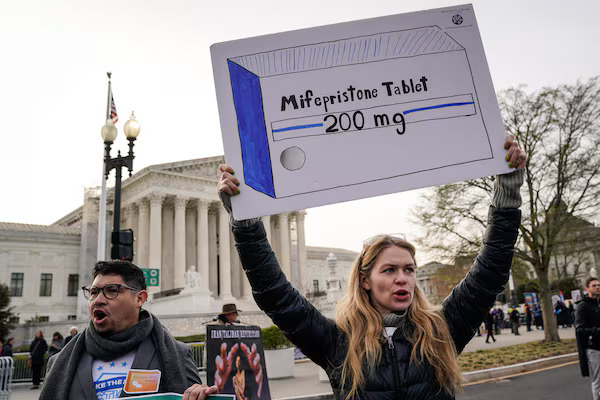Two years after revoking the constitutional right to abortion, the Supreme Court reversed course on Thursday by dismissing a challenge to the widely used abortion drug mifepristone. This challenge, if successful, would have restricted access to the drug and undermined the independence of the Food and Drug Administration (FDA).
The unanimous decision stated that the anti-abortion doctors who contested the FDA’s relaxed regulations on prescribing and dispensing mifepristone lacked a valid basis for their lawsuit.
The challengers’ “sincere legal, moral, ideological, and policy objections” to mifepristone do not give them the right to sue, Justice Brett Kavanaugh wrote in the majority opinion. Instead, he suggested that the anti-abortion doctors raise their objections through the FDA’s regulatory process or to Congress, and express their views through political and electoral channels.
Kavanaugh added, “Allowing doctors or other healthcare providers to challenge general safety regulations as too lax would be unprecedented and limitless, opening the door for them to sue in federal court over nearly any policy affecting public health.”
However, the court noted that it’s “not clear that no one else” could challenge the FDA’s relaxed regulation of mifepristone.
This decision comes amid a closely contested presidential campaign where reproductive rights are a major issue. The court has yet to decide if doctors can provide emergency abortions in states that have banned the procedure following the overturning of Roe v. Wade.
‘Cruel abortion bans’
“Today’s decision does not change the fact that the fight for reproductive freedom continues,” President Joe Biden said.
Erin Hawley, the Alliance Defending Freedom attorney representing the anti-abortion doctors, stated her group is not giving up. She pointed out that Missouri, Kansas, and Idaho have also challenged mifepristone.
“Although we’re disappointed with the court’s decision, we will continue to advocate for women and push for the restoration of commonsense safeguards for abortion drugs, such as requiring an initial office visit to screen for ectopic pregnancies,” Hawley said. “We are also grateful that three states are prepared to hold the FDA accountable for endangering the health and safety of women and girls across the country.”
Deciding the mifepristone case on procedural grounds allowed the justices to avoid the politically thorny question of whether to second-guess the FDA’s expert opinion, which was based on extensive evidence.
First approved in 2000, mifepristone is now used in nearly two-thirds of abortions in the nation. Its use has increased even after the Supreme Court overturned Roe v. Wade in 2022.
Its popularity has risen partly because the FDA determined it could be safely prescribed through a telehealth consultation and sent by mail. It can also be prescribed by pharmacists, expanding access to women in states where abortion is still legal and even in states where it is not.
The anti-abortion doctors had asked the Supreme Court to roll back the loosened rules after a lower court ruled they could not challenge the drug’s original approval. However, the high court said the doctors couldn’t do that either because they hadn’t demonstrated sufficient harm from the FDA’s decision.
‘Health care deserts’
The doctors don’t prescribe mifepristone. They argued that the FDA’s changes made it likely they would have to treat women with emergency complications from taking mifepristone, which they find morally and ethically objectionable.
The Justice Department countered that there were no examples of this happening and that doctors could raise a conscientious objection to treating the patient in such a rare scenario.
The Supreme Court agreed, stating that federal conscience laws “definitively protect” doctors from being required to perform abortions or provide other treatments that violate their consciences. This protection holds even in “health care deserts” where no other doctors are readily available.
This challenge marked the first time the Supreme Court was asked to overrule an FDA decision declaring a drug safe and effective. Doing so could have disrupted the pharmaceutical industry, drugmakers warned.
The case sent shockwaves through the medical and legal communities last year when a Trump-appointed district judge in Amarillo, Texas, suspended the FDA’s 20-year-old approval of mifepristone. The conservative 5th Circuit Court of Appeals in Louisiana restored the FDA’s approval but upheld other parts of his decision, setting the stage for a high court showdown that saw anti-abortion and abortion rights protesters facing off outside.
Danco Laboratories, makers of mifepristone, said the Supreme Court “maintained the stability of the FDA drug approval process, which is based on the agency’s expertise and on which patients, healthcare providers, and the U.S. pharmaceutical industry rely.”
The ruling was unanimous, despite Justices Clarence Thomas and Samuel Alito previously opposing the court’s decision to allow full access to the drug while the underlying lawsuit continued.
The combined cases are FDA v. Alliance for Hippocratic Medicine and Danco Laboratories v. Alliance for Hippocratic Medicine.






Be First to Comment